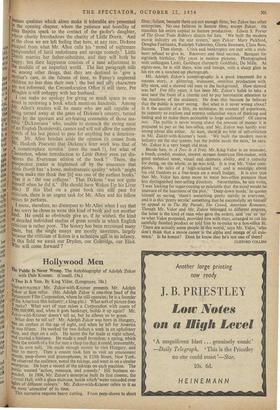Hollywood Men
The Public Is Never Wrong. The Autobiography of Adolph Zukor with Dale Kramer. (Cassell. 15s.) A Tree Is A Tree. By King Vidor. (Longmans. 18s.) UNFORTUNATELY Mr. Zukor-with-Kramer presents Mr. Adolph cukor at face value. (Mr. Adolph Zukor is one-time head of the Paramount Film Corporation, where he still operates; he is a founder 91 the American film industry; a king-pin.) What sort of picture does It make? What sort of man raises a Corporation with assets of 1300,000,000, and, when it goes bankrupt, builds it up again? Mr. Zukor-with-Kramer doesn't tell us, but he allows us to guess. What does he tell us? Mr. Adolph Zukor was born in Hungary, Was an orphan at the age of eight, and when he left for America he Was fifteen. He worked for two dollars a week in an upholstery shop, and slept on a sofa. He learnt the fur trade at night school, and started a business. He made a small invention: a spring, which Ina, de the mouth of a fox fur into a clasp (so that it could, presumably, pit( , its own tail). He made enough money to visit Hungary, and later to marry. Then a cousin took him to visit an amusement Littade, peep-shows and gramophones, in 125th Street, New York. le observed the audience, noted the takings, and went in on a similar ins enterprise. He kept a record of the takings on each machine. The Public wanted 'action, romance, and comedy.' His business ex- panded. In 1904, Mr. Zukor's enterprise built its first cinema, the Crystal Hall, with a glass staircase, inside which 'water cascaded over 0 lights of different colours.' Mr. Zukor-with-Kramer refers to it as the most 'attractive' of its time. films; failure, because there are not enough films; but Zukor has other enterprises. No one believes in feature films, except Zukor. He transfers his entire capital to feature production. Edwin S. Porter of The Great Train Robbery directs for him. 'We built the modern movie industry on the star system,' says Zukor: Mary Pickford, Douglas Fairbanks, Rudolph Valentino, Gloria Swanson, Clara Bow. Success. Then slump. Crisis and bankruptcy are met with a stub- born refusal to give in. Recovery and final success. Banquet for eightieth birthday, fifty years in motion pictures. Photographed with colleagues Laski, Goldwyn (formerly Goldfish), De Mille. At eighty-one, he is still there, wise and benign, with a sharp glint in his eye on a touched-up photograph.
Mr. Adolph Zukor's autobiography is a good treatment for a success story, a glittering, iridescent, omnibus production with fifty stars, and a shrewd old man in the background. How shrewd was he? For fifty years, it has been Mr. Zukor's habit to take a seat near the front of a cinema and to pay barometric attention to the reactions of the audience. He does this because he believes that the public is never wrong. But what is it never wrong about? Is it the quality of a film, its technique, its content of experience, its capacity to explore and express unfamiliar ways of thinking and feeling and to make them accessible to large audiences? Of course not. The public is never wrong about the amount of money it is prepared to pay at the box-office, and Mr. Zukor was hardly ever wrong about this either. At least, there is no hint of self-criticism in Mr. Zukor-with-Krarner's book. 'We built the modern movie industry on the star system, but the public made the stars,' he says. Mr. Zukor is a very tough old man.
Beside him, in A Tree Is A Tree, Mr. King Vidor is an innocent, a brash, candid, modest, sincere, earnest American film-maker, with great technical sense, visual and dramatic ability, and a capacity for doing, on the whole, as he was told. It is true Mr. Vidor com- plains. He talks of a 'high-salaried rut,' and is nostalgic about his old freedom as a free-lance on a small budget. it is also true that Mr. Vidor has done more to resist box-office pressure than less distinguished best-selling directors. Nevertheless, he can write, 'I was looking for sugar-coating so palatable that the mind would be unaware of the hoariness of the plot.' Deep down inside,' he quotes himself as saying, 'there's something pretty terrific in everyone,' and it is this 'pretty terrific' something that he successfully set himself to appeal to in The Big Parade, The Crowd, American Romance. Though Mr. Vidor and Mr. Zukor belonged to different empires, the latter is the kind of man who gave the orders, said 'yes' or 'no' to what Vidor proposed, provided him with stars, arranged to cut his carefully finished product or told him to re-make to a box-office fit. 'There are actually some people in this world,' says Mr. Vidor, 'who don't think that a movie career is the alpha and omega of all exis- tence.' Is he honest? Does he know that he's not one of them?
CLIFFORD COLLINS


































 Previous page
Previous page